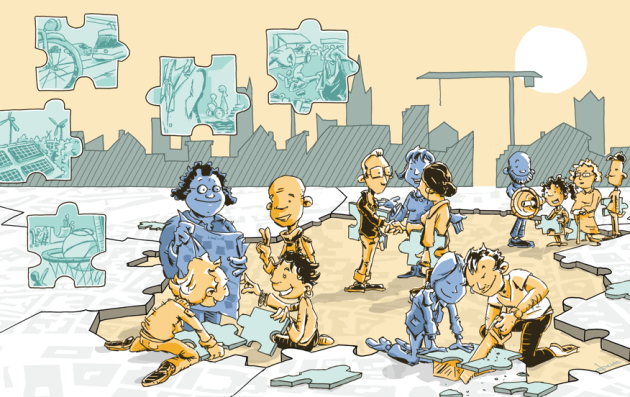Date of label : 29/10/2024
-
Ghent , Belgium
-
Size of city : 268.924 inhabitants

This image shows a group of people working for a more sustainable city.
Summary
Urban Renewal Programmes for Neighbourhoods achieved sustainable urban development in Ghent (BE) by moving away from short-term projects that only provide ad hoc solutions lacking context, to initiatives with a long-term vision. This sustainable change involved balancing social, economic, spatial, and environmental aspects, and tailoring the approach to each neighbourhood’s unique characteristics.
An integrated strategy that focuses on communication, people-centred planning, and community participation is key to success. Programme managers streamlined projects behind the scenes, while communicators engaged with stakeholders and provided information to residents. This approach allowed the realisation of urban renewal to meet Ghent’s needs.
The solutions offered by the Good Practice
Ghent’s neighbourhood-focused urban renewal resulted in tailor-made programmes to enhance quality-of-life, in line with the City of Ghent Strategic Urban Renewal Policy 2020-2025. Each neighbourhood benefits from spatial and social improvements, and economic initiatives, based on its own unique needs.
The first programme was launched in 1999, with extra staff and experimental projects driving urban renewal efforts. Residents were engaged at an early stage to help shape a vision for their neighbourhoods, ensuring renewal efforts reflected community needs and aspirations. The community was engaged through meetings, workshops, and participatory budgets, with a focus on improving social cohesion, economic opportunities, and well-being.
The impacts of the urban renewal programmes were captured using innovative methods, like theory of change, outcome harvesting, and storytelling. This has helped improve and adapt the approach to create vibrant, inclusive, and sustainable communities across Ghent.
Building on the sustainable and integrated urban approach
Ghent's urban renewal programmes start by creating a human-centred vision for each neighbourhood, with actions to achieve multiple goals. Priorities include green spaces, energy efficiency, and sustainable mobility with a focus on cycling and walking, to create a healthier city.
The city fosters revitalisation by supporting local businesses, creating vibrant zones that attract investment, and enhancing workforce skills to boost economic growth and resilience.
Ghent's approach focuses on social equity and community engagement to ensure affordable housing, improved public services, and social cohesion. Community participation from an early stage is encouraged, through consultations and collaborative planning processes, so that residents' views shape urban development. This integrated and sustainable approach creates synergies, to simultaneously tackle multiple urban challenges and build a resilient, adaptable urban fabric.
Based on participatory approach
Ghent’s urban renewal programmes focus on participation, and collaboration with diverse stakeholders:
- Citizen engagement: Residents participate through consultations, workshops, and planning sessions to ensure urban renewal meets local needs.
- Stakeholder collaboration: The city works with local government, businesses, academic institutions, and community groups, with universities driving innovation, and NGOs supporting social projects.
- Integrated project teams: Multidisciplinary teams (urban planners, environmental scientists, social workers, etc.) address all the dimensions of urban renewal.
- Neighbourhood councils: Councils and forums regularly monitor progress and ensure accountability.
- Digital platforms: These enhance transparency and participation, providing information and faciliating feedback.
Projects like Muide Meulestede Morgen show how extensive citizen engagement and stakeholder collaboration strengthen Ghent’s urban renewal programmes, making the process inclusive and transparent.
What difference has it made?
Ghent is currently running 10 urban renewal programmes, some initiated over 20 years ago and some still in the planning phase. These long-term programmes align with the city’s urban development vision, prioritising resident participation, additional housing, energy-efficient renovations, green spaces, and social initiatives. The urban renewal efforts aim to increase the quality of housing, and make renovation and replacement more efficient. Temporary use of vacant land and buildings is encouraged.
For example, "Bruggen naar Rabot" transformed Rabot with new housing, parks, and facilities; while the Tondelier site now has 530 homes, public amenities, and new office space. The Griendeplein project added 360 new social housing units, and improved living conditions.
Ghent's urban renewal programmes have revitalised local economies, enhanced housing, and boosted environmental quality. In areas like Rabot-Blaisantvest, crime rates are down and community activities have increased. Overall, these programmes address critical urban challenges, and help create sustainable, inclusive and vibrant neighbourhoods for all residents.
Why this Good Practice should be transferred to other cities
Ghent’s urban renewal programmes adopt a holistic approach that integrates social, economic, and environmental aspects, and align with key policy frameworks:
- Sustainable Development Goals (SDGs), particularly SDG 11 (Sustainable Cities and Communities) by promoting sustainable, inclusive and resilient urbanisation.
- The Urban Agenda for the EU, by fostering participatory governance and sustainable land use, and the Territorial Agenda 2030 by promoting balanced development.
The urban renewal programmes can be replicated in other European cities and adapted to their local contexts, such as local development plans, linked to national legislation and policy objectives, and available grants for renovation.
The practice could be easily transferable within the EU, as its key elements, such as participatory planning and collaboration between stakeholders, are universally applicable. Manuals and templates are available to help cities adapt the process to local needs and circumstances.
Ghent actively shares its good practice with other cities in Flanders, for example, and this has led several cities to adopt elements of its approach. Moreover, Ghent’s mayor highlighted the urban renewal programme's innovative methodology at the Eurocities meeting in Geneva in 2023, attracting interest from other European cities.
